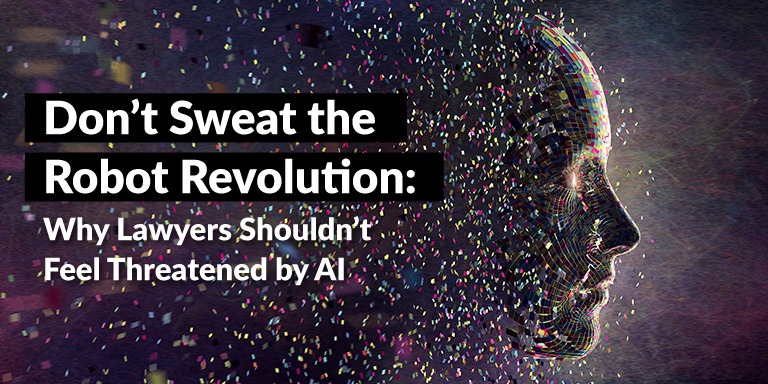Don’t Sweat the Robot Revolution: Why Lawyers Shouldn’t Feel Threatened by AI

As the president or founder of a law firm, it can be unsettling to flip through headlines like “Lawyer-Bots Are Shaking Up Jobs” and “Is Technology About to Decimate White-Collar Work?” Whether or not your own firm has invested in these kinds of new technology, you might start to wonder: Are these warning signs of what’s to come for the legal profession? Or, simply a way to bring some zest to a slow news cycle.
The fact that big-name firms like JPMorgan Chase & Co openly use legal bots to trim some processes by as many as 360,000 hours makes artificial intelligence (AI) seem like a real threat. But, today we’re writing to share good news: advanced machine learning is here to help your small- or medium-sized law firm, not hinder it.
AI replaces tiresome legal tasks
According to McKinsey researchers, about 22 percent of a lawyer’s job can be replaced by AI. If that statistic worries you, consider many of the tasks that smart technology can take over are administrative, perfunctory ones that tend to add bulk to a lawyer’s schedule: reviewing documents for errors, pulling up relevant cases and verifying background information. The real work of law – services such as combining research to reach new conclusions, constructing complex arguments, and, most importantly, nurturing client relationships – simply cannot be outsourced to a machine because they require a dynamic, thoughtful, human-to-human connection.
Far from replacing lawyers or limiting their ability to work, the use of AI in law firms will leave lawyers with more time to do the important, billable work they often struggle to prioritize because of the very tasks AI technology can take over – a win-win for law firms looking for ways to achieve the maximum possible level of efficiency and productivity.
Up-and-coming lawyers may need more support
Is there a downside to AI technology in law firms? Possibly. Some experts are concerned that because AI can often take seconds to do the kinds of tasks typically used to train students and entry-level lawyers over the course of several months, these individuals may be at a disadvantage as they enter the legal world.
While it’s a real possibility that AI can limit opportunities for those building up-and-coming law careers, it’s a problem that can easily be solved if firms embrace Deloitte’s call for a new talent strategy for legal talent. After all, incoming lawyers will need to be trained to manage these new technologies, creating room for new highly skilled roles that didn’t exist a few years ago. Firms that start to plan a new strategy now will find themselves prepared and ahead of the competition when this challenge comes to a head in 2020.
AI is no threat
Judging from the recent headlines in legal reviews and popular media, you’d think the robot revolution has begun in the field of law. But even if some of the biggest law firms and in-house legal departments are already using AI in the field, there’s no reason to think legal bots will be replacing a significant number of jobs anytime soon. Instead, law firms should be on the lookout for how they can apply advanced machine learning techniques to automate perfunctory, low-level tasks to free up your team’s time for more intensive work.